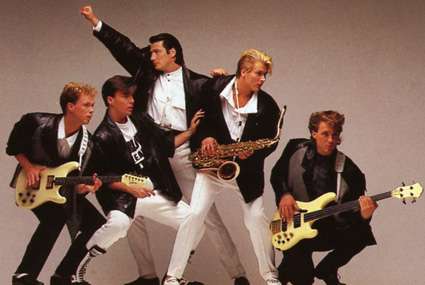Spandau Ballet

Spandau Ballet is a British pop band with Soul, Funk and Synth Pop influences. Along with groups such as Duran Duran and ABC they were pionners of the New Romantic movement, producing the style's first major hits with their debut single "To Cut A Long Story Short" and their first album Journeys to Glory, both of which entered the top ten of the repective charts.
The group was formed in 1979 by London art school students Gary Kemp (lead guitar, keyboards and songwriting), Steve Norman (second guitar, synthesizer and percussion) and John Keeble (drums). The addition of Steve's friend Tony Hadley on lead vocals and Gary Kemp's younger brother Martin on bass guitar completed the line-up. Adopting the name Spandau Ballet and an over-the-top New Romantic mode of dress which included frilly shirts and kilts, the group recorded their successful debut album, Journeys to Glory, which mixed funk rhythms with New Wave pop melodies. However, their second album Diamond was less successful in spite of producing one of the group's biggest hits, "Chant No. 1 (I Don't Need This Pressure On)".
For their third album, True, the band switched styles to a more soulful pop sound, with Steve Norman moving from guitar to saxophone. The new sound was a hit and the album went to the top of the charts, producing the group's sole UK number one and only American top ten hit, "True", as well as signature hits such as "Gold" and "Lifeline". The band were able to maintain their momentum with Parade and the rock album Through The Barricades, but they never quite matched the success of True and began to drift apart. The Kemp brothers' increasing involvement in film and television acting earned the ire of the rest of the group and Spandau Ballet split acrimoniously in 1990. A few years later, Tony Hadley, John Keeble and Steve Norman mounted an ultimately unsccessful court case against Gary Kemp over several years worth of unpaid royalties (Kemp wrote all of the songs but had supposedly agreed to share royalties with the rest of the group).
In spite of the consequent poor relations between the band members, the band managed to surprise everyone by successfully reforming in 2009 with a reunion tour and a new album called Once More, featuring acoustic covers of their old hits.
- All Drummers Are Animals: John Keeble, leather clad Zeppelin fanboy who uses two bass drums (he was the only drummer at Live Aid to do so), though he seems to save it for his "I Play Rock" side project.
- Audience Participation Song: "Fight For Ourselves", "True" and some others.
- Breakup Breakout: Gary and Martin Kemp broke out after the band broke up, but as actors rather than musicians.
- Epic Riff: The guitar and horn riffs in "Chant No. 1".
- Mr. Fanservice: The whole group in the eighties, just like all of the New Romantics.
- Follow the Leader: A lot of prospective synthpop groups and New Romantics followed their lead in the early eighties. By the end of the decade, Spandau Ballet themselves would be accused of switching their sound to compete with the AOR trends.
- Former Child Star: Martin Kemp, who appeared in several BBC series ranging from Dixon of Dock Green to Jackanory at the age of ten.
- Instant Expert: According to the Kemp brothers, Steve Norman. He had never played a saxophone before the third album but after recording "Chant No. 1" with a horn section, he decided he'd like to try it, so he got himself an instrument and learned to play it in about a week.
- Large Ham: Tony Hadley, in spades.
- Mohs Scale of Rock and Metal Hardness: Never really went any higher than two. Through the Barricades seemed to be aiming for about a five, but the instrumentation is just too polite to manage more than a three. They did a better job of it when they played live.
- New Sound Album: True, to a certain extent, which moved away from the band's Synth Pop roots towards a sound more influenced by American soul music.
- New Wave
- Power Ballad: "Through the Barricades" is a text book example. It has it all: acoustic guitar intro, big anthemic chrous, big crashing entry for drums and guitars at the beginning of the chorus and eighties soprano sax. It works really well.
- The Rival: During the Eighties they had a rivalry with Duran Duran, but it wasn't as serious as the music press often made it out to be.
- Standard Snippet: "Chant No.1" has become this for evoking the early 1980s.
- Surreal Music Video: To be expected of a New Romantic band.
- Synth Pop: Their earlier material was predominantly this - Vince Clarke claims that "To Cut a Long Story Short" was a major influence on the writing of "Just Can't Get Enough" by Depeche Mode.
- Ur Example: Between the weird outfits and extensive synth work they were the quintessential New Romantic band in their early period. "To Cut a Long Story Short" was the first big New Romantic hit and the term "New Romantic" itself was coined by a music journalist to describe the band.
- Word Salad Lyrics: Quite a lot, but most famously "Instinction" ("Stealing cake to eat the moon", et cetera).